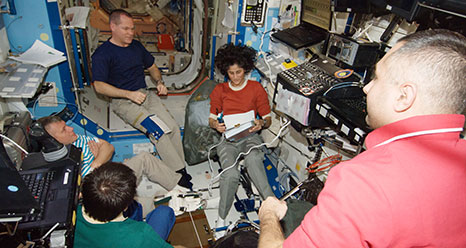.



Now, it is time to start thinking about coming home. Up to this point I haven’t, and sort of denied it. I am still in denial, but I am going through the motions because I don’t want to forget something when the hatch closes … so we are preparing.
Space is just really cool. I love it here, just like most folks who get to come here. It is just so cool how we adapt and become so comfortable up here. You can be standing one moment and with just a little effort, flip upside down and be hanging – “look ma, no hands!” It is just an amazing place to be. Not to mention the view … why would anyone want to leave?
So, you might ask, what do you have to pack? It is a little like the airlines, we do have a baggage limit, but slightly less – only 1.5 kg in the Soyuz. That is like 3.5 lbs., so not much. We all brought that much personal stuff up here, so we know pretty much how much we can take back – essentially the same stuff we brought up comes back down with us in the Soyuz.
We don’t pack our clothes, toothbrush, toothpaste, shampoo, etc. That stuff is all here when we arrive. Even our special shirts and cargo pants are waiting here for us. But this is our personal stuff, so no one else will want it.
I have worn essentially one pair of pants and one pair of shorts this entire trip. We don’t get “dirty” up here with dirt, but we are working on equipment, and sometimes little stains get on your clothes. Additionally, we don’t do laundry up here – we just get new stuff and throw away the old stuff. We don’t need to change our clothes as much as we do on the ground – not anyone up here to impress, and “smell-o-vision” has not been invented yet. Just kidding.
So, back to packing – I have some stuff, like my Yo-yo, my crew notebook with pictures, my specialty t-shirts I had sent up, my family photo album. It’s funny that your life actually boils down to these little things – really, think about it. Not much more is really important than the people (animals included), places and memories you have!
Last week was busy … and of course it was fun because we are in space! It doesn’t get better than that, even when all your computers don’t work and the toilet gets really broken.
Being high tech, we have tried to go paperless as much as possible on the ISS. This is great, and GREEN, but everything sort of comes to a screeching halt when the computer system, which provides you with all the information about your schedule and activities, dies. This happened bright and early one morning and put a little damper on our activities.
Luckily enough, all the workout equipment kept on plugging along for the most part, so we were able to buy back a little time by working out for a while, while the computer guys on the ground worked their magic on our systems. It took the better part of the day, with a little help from us, for them to reload the hard drives of two of our main servers. We do the hardware stuff and they can do all the software configurations from the ground. It is interesting to see how vulnerable we are to these types of problems. I know the folks on the ground were scrambling to get all of our systems working again.
The big thing that was not working quite right last week was the toilet. We changed out practically every part in that thing system. The KTO, or solid waste function of our toilet, was working fine. It was just really the urine processing part. We really need to make sure the right balance of urine to chemicals is put into the system to make sure the downstream components, which turn the urine back into drinking water, don’t fail. As a result, the water valves, all plumbing, two sensors and finally the water pump were all changed out. In the meantime – we used the Russian toilet – all six of us using one toilet is rough!
Aki, Yuri and I fit in our Sokol (space) suits and our Soyuz. You know we grow up here so there is always a question about if we will really fit. In space your spine expands so you grow. The cartilage between the vertebrae doesn’t have the pressure of gravity on it, so it expands and hence, you grow. I did notice this when we were getting our suits on. I had to lengthen all the straps to get my head thru the opening. It was a little tight, but all worked out fine.
Another impression I had was wow – that Soyuz is small. It felt big when we flew up here and even roomy. But now, after living in this “grand hotel,” it seems tiny! Actually, after I nestled my way into my seat – you don’t just sit in space, you have to get held down, and that seat is actually like being in the fetal position, so you have to tighten your belts, nestle down, tighten some more, nestled down, until you are all the way in there. It felt pretty good. Of course, your knees are in your chest.
Regardless of these strange sensations, the Soyuz automatically felt like home. We all know what we need to do in there – the training is that good I think – that you don’t really think too much about it. You just know what to do.
Quelle: Suni-Blog
